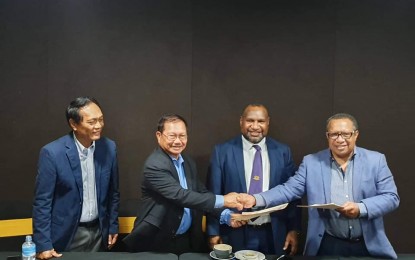
PACT ON AGRI COOPERATION. Papua New Guinea Prime Minister James Marape and Philippine Ambassador to PNG Bienvenido Tejano witnessing the signing of an MOU on agricultural cooperation between Central Province Governor Robert Agarobe and Mindanao rice farmers, represented by MinDA Chairman Emmanuel Piñol, last week. (MinDA chairman Emmanuel Piñol's Facebook photo)
DAVAO CITY – Mindanao Development Authority (MinDA) chair Emmanuel Piñol on Tuesday defended his move to make agriculture one of his focuses, even as critics were saying he was no longer the agriculture secretary.
“While Agriculture in Mindanao is only one of the concerns of MinDA, it is now focusing on the basic issues of giving fruit, coconut and rice farmers access to the market. Failure on the part of the government to address this basic issue could lead to economic woes, which could result in security problems in Mindanao,” Piñol said.
Criticisms were hurled against Piñol following MinDA's fruits festivals in Luzon and his recent trip to Papua New Guinea, where he forged an agreement with Central Province Governor Robert Agarobe for the export of Mindanao rice to the Pacific nation. Under the agreement, PNG's Central Province Government will become the importer of Mindanao rice.
“Not a few called the idea of exporting "dumb" because they could not seem to understand why Mindanao would export its rice while the rest of the Philippines is importing. The recent implementation of the Rice Liberalization Law, which resulted in the flooding of the local market with imported rice, has brought down the farm gate price of locally produced paddy rice to as low as P10 to P12 in many parts of Mindanao,” he said.
He said farmers also experienced being turned away by traders because it was more profitable to just import from either Thailand or Vietnam.
Piñol said the loan support, free seeds and implements and commitment by the local government units to buy farmers' produce “do not address the problem of market denial.”
He said the export opportunities now being offered has opened the door for Mindanao farmers, especially when they started shifting to the production of premium rice varieties such as Dinorado, RC160, RC218 or Double Diamond, 7-Tonner or Banaybanay Rice, which command higher prices.
“This could (also) be the start of the shift to Organic Rice farming to serve the needs of a niche market of health-conscious consumers who prefer chemical-free rice,” he added.
Piñol said what he was doing at MinDA is plain and simple logical.
“MinDA will help Mindanao Rice farmers gain access to foreign markets with large Filipino communities with a marketing pitch, which would emphasize that by buying Mindanao Rice, they not only get a quality product but they will also help Filipino farmers survive the onslaught of unimpeded entry of imported rice. So, to those asking why Mindanao will export while the rest of the country imports, the answer is simple: Traders are importing a commodity while Mindanao is exporting a special product,” he added.
Piñol said the marketing strategy was to present Mindanao's Premium Rice “as a special product to enable it to command a better price and ensure farmers a decent income.” (PNA)
